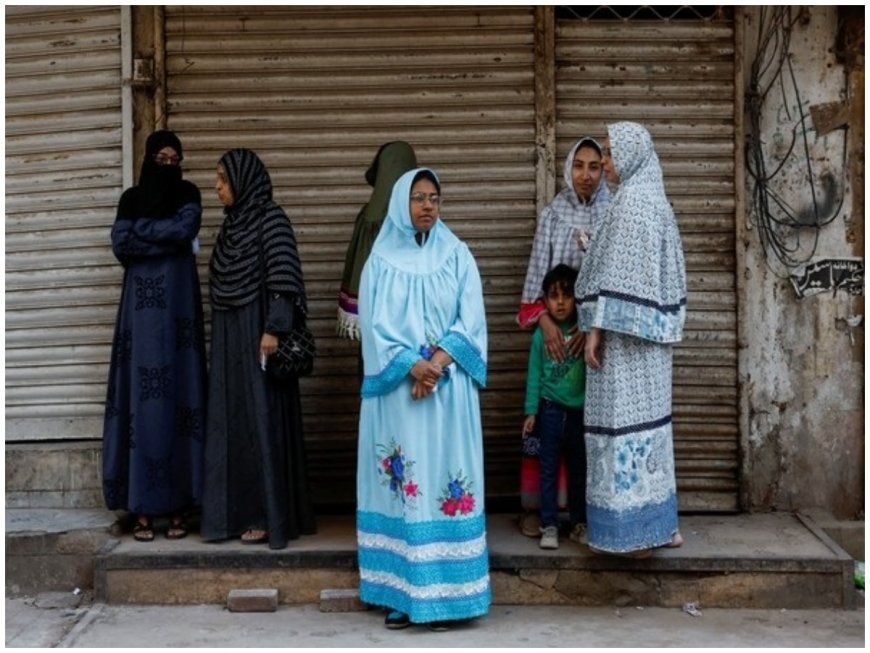Pakistan’s Gender Gap Index Nears Lowest Rank, Second Worst In The World
In the latest Global Gender Gap Index, Pakistan finds itself near the bottom of the list, with only Sudan ranked lower among 146 nations surveyed.

Lahore: Pakistan is positioned relating to the underside inner the important most contemporary World Gender Gap Index published by the World Economic Discussion board (WEF), with best Sudan ranked decrease between 146 nations surveyed. Reasonably, this marks a drop from its 142nd purpose final 12 months, highlighting a worsening scenario for females inner the united states, as reported by Break of day.
Women’s rights activists have issued impassioned pleas for each and each kingdom and societal commitment to deal with gender disparities efficiently. They emphasise the redefine the roles prescribed to females folk by Pakistani society and the federal executive.
The annual index evaluates gender parity across 4 quintessential dimensions: economic participation and resolution, tutorial attainment, good-being and survival, and political empowerment. Great nations in gender parity comprise Iceland, Finland, Norway, New Zealand, and Sweden, as reported by Break of day.
“This 12 months’s dismal ranking obtained't be to any extent further an anomaly; Pakistan has normally lagged inner the index for over a decade,” identified Bushra Khaliq, Executive Director of Women in Struggle for Empowerment (WISE), reflecting on Pakistan’s potential challenges in accomplishing gender equality.
Comparatively, neighbouring nations have fared improved in closing their gender gaps.
Breaking down the rankings across sectors displays stark disparities. In economic participation and resolution, Pakistan ranks 143rd, with Bangladesh at 146th. Tutorial attainment sees Pakistan at 139th, trailing on the to come again of Bangladesh (A hundred and twenty fifth). Political empowerment stays a undertaking, with Pakistan at 112th, critically on the to come again of Bangladesh (seventh).
In step with the WEF doc, Pakistan’s most contemporary drop inner the index namely stems from setbacks in political empowerment, whether or not tender improvements in tutorial attainment. Gender disparities persist prominently in economic and political spheres, alongside gaps in tutorial attainment and good-being consequences.
Reflecting on political empowerment, Farah Zia, Director of the Human Rights Commission of Pakistan, highlighted challenges faced by females folk in mainstream politics. “Recent political manoeuvres have headquartered females folk leaders and activists, undermining their purpose and affect,” Zia lamented, citing incidents of headquartered incarceration and prison obstacles.
Even with a 33 per cent quota for females in parliament, Zia spoke of that unimaginable illustration stays elusive for females no longer affiliated with influential political families or urban centers.
Addressing economic roles, Bushra Khaliq identified some progress in sectors like textiles and vogue but highlighted pervasive exploitation inner the informal zone. “Women in Pakistan predominantly work in precarious should haves, limiting their economic empowerment,” Khaliq remarked.
The good-being zone provides alarming particulars, with serious maternal mortality charges and insufficient reproductive good-being offerings plaguing females folk across Pakistan. Tutorial boundaries as good compound gender disparities, with roughly 25 million out-of-collage teenagers, predominantly females folk, missing get entry to to classic coaching, per Break of day.
Farah Zia underscored the affect of unchecked populace development on females folk’s development, critiquing executive policies that prioritise populace-linked incentives over sustainable human development. “The dearth of discourse on reproductive rights has profound implications for females’s good-being, coaching, and fiscal participation,” Zia emphasised.
Every Zia and Khaliq pointed to entrenched patriarchal norms and societal resistance, exemplified by contentious reactions to things to do linked to the Aurat March. “Society’s resistance to females folk’s rights exacerbates gender disparities,” Zia identified, calling for concerted efforts to undertaking and alter into patriarchal mindsets.
In closing, activists advised potent commitments from the kingdom and society to redefine females folk’s roles and make positive gender parity. “Progressive steps are quintessential for integrating females folk into the socio-economic cloth of Pakistan,” Zia asserted, advocating for full defense reforms and grassroots empowerment initiatives.
Seriously appraising governmental departments’ roles, Khaliq highlighted the need for accelerated know-how transparency and collaboration with international enterprises. “True know-how reporting is quintessential for measuring progress and advocating for defense reforms,” Khaliq emphasised, urging elevated accountability and transparency.
The WEF doc underscores simply how pivotal it enormously is for us to introduce economic strategies that comprise and uplift females folk, working in opposition to bridging probably probably the most up-to-date gender gaps suitable by the globe. The core of the doc infers that arriving at economic parity between genders obtained't be to any extent further merely a focus on social justice but additionally a necessity for economic development. It sends a call out to governing our bodies to location gender equality on the forefront of their agenda for using sustainable development and sparking innovation, as included by Break of day.
What's Your Reaction?



























































